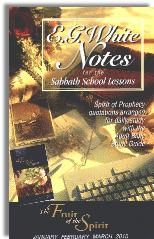|
||||||||||||||
Commentary on "The Fruit of the Spirit is Patience"
Day 3: Monday, January 25, 2010
Overview
The heading for Monday's study is "Patience Required". The author encourages the reader to have patience towards the inevitable mixture of people that can be found in a church body. The author also encourages patience towards less "mature" believers and family members. Patience is also "required" for those who are "weak in the faith". And lastly, patience is needed for those who are "out of the faith".
Observations
This specific day seems to be a conglomerate of thoughts without a definite theme running through it. The lesson seems to try to define what types of people a believer should be "patient" with.
The lesson's author encourages patience with less mature believers. Unfortunately, the author doesn't define spiritual maturity accurately. According to the author spiritual maturity relates to the level of "knowledge and understanding" a person has. "Often the mature are unwilling to give the immature the same amount of time and study to reach their level of knowledge and understanding." This idea that spiritual maturity is equivocal with knowledge and understanding is a common theme in Adventistism. Intellect is lauded, particularly if someone can explain the many doctrines of the Seventh-day Adventist Church.
Jesus, Himself, indicates that someone can have scriptural knowledge, but miss eternal life. "You search the Scriptures because you think that in them you have eternal life; it is these that testify about Me; and you are unwilling to come to Me so that you may have life." Someone may know the words of scripture, but miss the Word (John 1:1-3). Growth in Christ begins the moment someone places their faith solely in Christ for salvation. Spiritual maturity comes as a person begins to trust more and more that God is Sovereign and will supply their every need.
Hebrews compares those who are spiritually mature with people who eat solid food, while those who are immature still live on milk. "But solid food is for the mature, who because of practice have their senses trained to discern good and evil. (Heb. 5:14; NASB) Hebrews continues to expound on this idea of maturity, "Therefore leaving the elementary teaching about the Christ, let us press on to maturity, not laying again a foundation of repentance from dead works and of faith toward God, of instruction about washings and laying on of hands, and the resurrection of the dead and eternal judgment. (Heb. 6:1-2; NASB) The author of Hebrews further expounds in chapter 6 that God desires better things for His children than the foundational things mentioned in Heb. 6:1,2. God desires His children to "take hold of the hope set before us".
"This hope we have as an anchor of the soul, a hope both sure and steadfast and one which enters within the veil" (Heb. 6:18b-19; NASB). The spiritually mature are unshakeable in the promises of God and the sufficiency of Christ for salvation and their every need. The spiritually mature no longer rely on dead works.
In conclusion, the author has a subtle play-on-words. "How long should we pray for family members who are out of the faith? Have you ever known anyone who had to pray for a loved one for many years before the person gave his or her heart to the Lord?" The term "out of the faith" is never heard in Christianity/evangelicalism. In Christianity you either have faith in Jesus or not. They use terms such as "believer" and "unbeliever" meaning: You either believe (believer) in Jesus Christ for salvation or you don't (unbeliever) . O'fill's phrase "out of the faith" indicates a very common understanding in Adventism. Faith is in the Seventh-day Adventist denomination and doctrines. Therefore, "out of the faith", means the person is not a Seventh-day Adventist. Yet, the confusing part and double-talk of the writer's language is in the next sentence, "Have you ever known anyone who had to pray for a loved one for many years before the person gave his or her heart to the Lord?" And this is the crux of Adventism, double-speak. "Belief" is seen as belief in the Adventist doctrines, particularly the Sabbath. Belief for Adventists is always Jesus plus. Scripture is very clear that salvation is belief in Jesus "period" (John 5:24; John 6:27-29; 1 John 5:11-13). A Christian doesn't pray someone into a denomination. Instead, a Christian prays someone into Jesus Christ.
Summary
- Spiritual maturity is reflected by a steadfastness in Jesus for salvation and every need; not in knowledge of scripture.
- Christians pray for nonbelievers to accept Jesus as the sole means of salvation.
- Seventh-day Adventists pray that people become Seventh-day Adventist.
GO TO DAY 4
Copyright 2010 BibleStudiesForAdventists.com. All rights reserved. Revised January 21, 2010. This website is published by Life Assurance Ministries, Glendale, Arizona, USA, the publisher of Proclamation! Magazine. Contact email: BibleStudiesForAdventists@gmail.com.
The Sabbath School Bible Study Guide and the corresponding E.G. White Notes are published by Pacific Press Publishing Association, which is owned and operated by the Seventh-day Adventist church. The current quarter's editions are pictured above.
Official Adventist Resources
Standard Edition Study Guide Week 5
Teacher's Edition Study Guide Week 5
Easy Reading Edition Study Guide Week 5
Search the Complete Published Ellen G. White Writings


